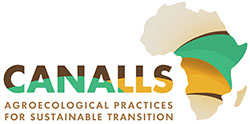In order to support farmers and other rural stakeholders of CANALLS communities in adopting agroecological and more sustainable farming practices, it is very critical to also analyse and segment the markets for the agroecological products produced in our Agroecology Living Labs.
Our living Labs are testing different agroecological practices for cassava, rice, maize, coffee and cocoa in diverse agricultural landscapes in our focal countries (DRC, Burundi, Cameroon and Rwanda) and it is thus, critical that we analyse both the potential of both domestic and international markets, reflecting on the differences among the crops and their consumption suitability. For that purpose, we have performed an extensive desk research combined with questionnaires and expert judgment to expand our knowledge and understanding on the challenges and opportunities for our agroecological products.
For which crops local markets are more important?
Cassava, maize and rice are predominately targeting the local markets as they are staple food items in our focal countries, playing a crucial role in the diet of the people. For the different crops and countries, exist different segments in the generic market (with various B2B and B2C) as well as in the targeted agroecological market (B2B & B2C), representing diverse business and consumer categories. Our analysis identified an array of challenges and barriers for agroecological products reaching the local markets of our focal countries, such as the lack of awareness among consumers and other stakeholders, the high prices of agroecological products and the limited access to markets and financial support among others. The wide array of existing challenges highlights the need for a multifaceted approach to overcome them with the support of stakeholders at different levels and close collaboration with government agencies, NGOs, farmers, cooperatives, consumers and the private sector. In order to overcome them, we need to build a coordinated strategy that increases awareness, develops a strong supply chain, provides support to farmers and targeted policies that support the transition to more sustainable farming systems.
For which crops international markets are more important?
As expected, coffee and cocoa are the two crops that international markets play a major role for them. There is a global surge in demand for ethically sources and sustainable products and consumers preferences at that scale shape their preferences based on aspects such as the environmental impact of the products, fair-trade practices and quality. Our analysis identified an array of B2B and B2C segments for coffee and cocoa, some being common ones, showcasing the many opportunities available for our agroecological products in the international markets. However, there are still many challenges our focal countries face hindering the transition to agroecological and organic coffee and cocoa. For example, farmers are lacking the necessary knowledge and training in organic and agroecological practices and they also lack in entrepreneurship competence among many others.
Way forward to access the markets
Developing value propositions for agroecological products that align with the local preferences, emphasising on the nutritional benefits, support for local farmers and environmental sustainability they can offer are paramount to access the local markets for cassava, rice and maize. We need to follow targeted approaches that recognize the variations in income levels, cultural characteristics as well as access to information. We need to refine our value propositions based on the insights gained from this analysis, implementing local marketing strategies that foster community engagement to increase the consumers awareness and acceptance of sustainable farming.
The design of the value propositions to reach the international markets is quite different than for the local ones as in this case we need to emphasise more on the distinct origin, the sustainable cultivation methods and faire-trade aspects of the products. To access international markets with agroecological coffee and cocoa, we need to build and strengthen partnerships with international certification bodies, increasing the transparency in the supply chain and leveraging the unique narratives of each product and farming practice in our rural communities to differentiate them in the competitive global markets.



